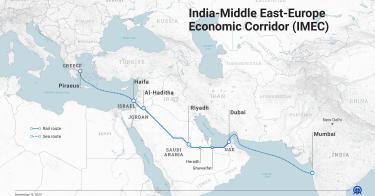When Hamas launched its October 7, 2023 terror attack, with the support of its Iranian patron, its goal was not just to murder and kidnap as many Israelis as possible. It also sought to undermine the positive momentum towards Israeli-Arab normalization begun with the 2020 Abraham Accords.
Now that U.S. and Israeli strikes have significantly weakened Tehran’s military strength and regional influence, it’s time to redouble efforts to advance regional integration in the spirit of the historic Abraham Accords peace agreements.
The most feasible avenue for promoting such integration at the current moment is via multilateral regional initiatives such as the India-Middle East-Europe Economic Corridor (IMEC). IMEC cannot only help expand regional cooperation, despite geopolitical tensions, but can further U.S.-led prosperity across the Middle East. President Trump should convene, before the end of 2025, an IMEC Leaders Summit in order to turn the vision of a U.S.-aligned trade, energy and digital corridor linking East and West into a reality.
According to the IMEC Memorandum of Understanding (MOU), signed at the September 2023 G20 Summit, the corridor is “expected to stimulate economic development through enhanced connectivity and economic integration between Asia, the Arabian Gulf, and Europe.” The MOU was signed by the U.S., India, UAE, Saudi Arabia, EU, France, Germany and Italy, and explicitly included Israel as a key part of the envisioned overland rail route.
>>> The Path to Greater Peace in the Middle East Is Clear
IMEC is expected to decrease the transit time from India to Europe for critical goods such as pharmaceuticals and electronics by more than 50% on average. It will serve as an alternative to the Chinese-led “Belt and Road Initiative” and to the Iran and Russia-dominated “International North-South Transport Corridor.” The corridor will spur investment, employment and growth across the projected route, while creating significant opportunities for American infrastructure, logistics and transportation companies.
Twenty-eight days after the signing of the IMEC MOU in 2023, Hamas launched its October 7 terror attack, triggering the ongoing multi-front war in the region. While the existing Abraham Accords agreements have largely remained stable, progress towards deepening and expanding regional normalization has slowed. Multilateral endeavors like IMEC are the most promising avenue for restarting the momentum of regional cooperation, given geopolitical tensions and the negative impact that the Gaza war has had on public opinion towards Israel in the Arab world.
IMEC has received renewed interest since the reelection of President Trump. When Trump met with Indian Prime Minister Narendra Modi at the White House in February 2025, he announced that the leaders had “agreed to work together to help build one of the greatest trade routes in all of history. It will run from India to Israel to Italy and onward to the U.S., connecting our partners, roads, railways and undersea cable.” The joint statement released following the meeting included the commitment to convening “partners from the India-Middle East-Europe Corridor and the I2U2 (India-Israel-U.S.-UAE) Group within the next six months in order to announce new initiatives in 2025.”
The success of the June 2025 U.S. and Israeli operations against the Iranian nuclear and ballistic missile threats have created the conditions for moving ahead with this ambitious project. Israel has already severely degraded Iran’s proxies Hamas and Hezbollah. Now, following the ’12 Day War’ between Israel and Iran, which included America’s Operation Midnight Hammer, Iran is weaker than ever. Its ability to disrupt the development of IMEC has been greatly diminished. By advancing IMEC, the U.S. can demonstrate its leadership in the region, and further roll back the influence of China, Russia and Iran.
We recommend that President Trump convene in 2025 an IMEC Leaders Forum with all partner countries, including Israel and Jordan. Each participating country should commit to advancing the domestic steps necessary to make IMEC a reality. The Forum should establish a standing Secretariat with one high-level champion from each country, as well as Working Groups in the fields of Infrastructure, Financing, Security, and Customs and Regulations.
The Secretariat should then convene a public-private summit with the participation of a broad range of stakeholders, including governments, sovereign wealth funds, development banks, investors and private sector companies, in order to identify financing options for each project. The United States, EU and G7 should declare IMEC a priority project within the framework of the Partnership for Global Infrastructure and Investment and the EU’s Global Gateway.
Countries along the IMEC route should work together, with the assistance of the U.S., to harmonize standards, regulations, customs and tariffs, in order to ensure efficient transit and remove bottlenecks. The benefits of IMEC can be maximized by implementing cutting-edge technologies throughout the route, including AI-powered predictive logistics and supply chain management, block chain-based event logs, and multi-country e-commerce platforms. Special Economic Zones should be created along the corridor, with tax and investment incentives, in order to attract investors.
Chinese influence along key nodes of the IMEC route, such as ports and rail lines, cannot be ignored. Participating countries will need to take steps to mitigate Chinese involvement in infrastructure along the corridor.
Successful collaboration on IMEC could serve as a model for groundbreaking multilateral cooperation in other crucial sectors, such as artificial intelligence, water and food security. Hamas and Iran sought to undermine normalization. The response must be a renewed commitment to regional integration, and to shaping a peaceful and prosperous future for the entire Middle East.
This piece originally appeared in RealClear World



